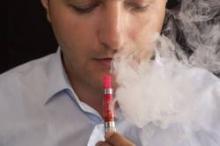A Food and Drug Administration proposal to regulate e-cigarettes does not go far enough, the American Society of Clinical Oncology and the American Association for Cancer Research say.
The two societies offered their general support for the agency’s proposed rule that would broaden its regulatory oversight over tobacco products in general, but offered suggestions to take the proposal even further.
In the area of e-cigarettes, the American Society of Clinical Oncology (ASCO) and the American Association for Cancer Research (AACR) called for the agency to regulate both electronic nicotine delivery systems (ENDS) as well as the component parts such as the liquids sold separately as refills for e-cigarettes. Additionally, the FDA "should develop a product standard that would require all e-liquid refill bottles to be childproof, including childproof caps for eye-dropper refill bottles," the societies said in comments they submitted together to the FDA on the proposed changes. "Future research may point to the need for additional product changes for ENDS, including standards regulating design, constituents, nicotine levels, or other chemicals including ENDS vapor, and we encourage [the] FDA to require such changes as appropriate to protect the public health."
The FDA issued its proposed rule in April.
In a statement, Dr. Roy Herbst, chair of the AACR Tobacco and Cancer Subcommittee and chief of medical oncology at Yale Comprehensive Cancer Center of New Haven, Conn., noted that there is "insufficient data on the long-term health consequences of e-cigarettes, their value as tobacco-cessation aids, or their effects on the use of conventional cigarettes. Any benefits of e-cigarettes are most likely to be realized in a regulated environment in which appropriate safeguards can be implemented."
Other areas highlighted by the groups that reach further than the FDA’s current proposal include product labeling, marketing, and product flavoring.
For example, the groups call for the FDA to strengthen its proposal in the sales, marketing, and advertising area by expressly prohibiting "self-service displays of tobacco products in retail establishments; the provision of gifts and other giveaways with purchase of tobacco products; the sale and distribution of items such as hats or t-shirts with tobacco product brand logos; brand-name sponsorship of athletic, musical, or other social or cultural events, or any team entry into those events; and youth-oriented advertising of tobacco products, including the use of cartoon characters in tobacco product advertising, promotion, packaging, or labeling." These would apply to all tobacco products, including e-cigarettes and cigars.
These marketing restrictions would enhance the FDA’s proposal to require manufacturers to submit new product marketing materials for agency review, AACR and ASCO say. The groups also call for stronger age-verification rules related to the Internet purchase of tobacco products.


